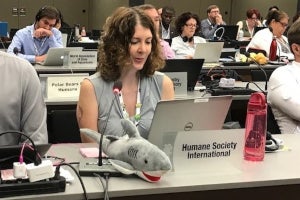
Humane Society International engages with international agreements that either directly or indirectly affect animals on a large, global scale. The adoption or rejection of one international measure can affect thousands or even millions of animals. We actively lobby for stronger protections and against weakening of protective measures at the following:
The United Nations and its General Assembly and Food and Agriculture Organization address many issues involving animals and the environment. The Humane Society of the United States has had official consultative status with the United Nations Economic and Social Council (ECOSOC) since 1996.
The Convention on International Trade in Endangered Species of Wild Fauna and Flora (CITES) is a United Nations agreement that aims to protect certain species of wild fauna and flora against over-exploitation through international trade in animals, plants and their products. HSI experts regularly attend CITES meetings and contribute by preparing research materials for consideration by the country delegates.
The Convention on the Conservation of Migratory Species of Wild Animals (CMS) is a United Nations agreement that aims to conserve terrestrial, marine, and avian migratory species throughout their range. Range states may create global or regional agreements under the CMS umbrella for certain listed species. HSI is an official cooperating partner of the CMS and some of its subsidiary agreements, including the CMS Sharks MoU.
The International Whaling Commission regulates whaling and whale conservation. In 1982, the IWC voted to ban commercial whaling, a move that ended the slaughter of hundreds of thousands of whales. Despite the ban, Japan, Iceland and Norway continue to hunt whales commercially and work to overturn the ban. HSI experts attend the biennial meeting to fight for whales.
The Inter-American Tropical Tuna Commission (IATTC) is responsible for the conservation and management of fisheries for tunas and other species – such as dolphins, sharks, sea turtles and seabirds – in the Eastern Pacific Ocean
The Agreement on the International Dolphin Conservation Program (AIDCP) was formed under the IATTC to limit the number of dolphins that die from being caught in fishing nets targeting the tuna that swim beneath them in the Eastern Pacific Ocean. In the United States, tuna caught using this method cannot be labeled “Dolphin Safe,” but the AIDCP has a similar label used by other member countries in spite of the risk to dolphins.
The Inter-American Convention for the Protection and Conservation of Sea Turtles (IAC) is an intergovernmental treaty that promotes the protection and recovery of the populations of marine turtles and their habitats in the Americas, including nesting beaches and territorial waters.
Free Trade Agreements have the potential to positively influence the lives of billions of animals across the globe. This is why HSI in the EU has been engaging with the negotiators for trade deals with Mexico, Vietnam, Mercosur, Australia, New Zealand and Indonesia to ensure the inclusion of robust provisions to protect animals.
The World Trade Organization (WTO) is an organization established in 1995 to oversee the multilateral trading system. It offers both a platform for negotiations of new rules and a mechanism to settle dispute over the compliance of existing rules. The outcome of WTO decisions has the ability to either strengthen or weaken animal protection policies of member countries. Therefore, HSI pro-actively engages in WTO-related events like the Public Forum and submits amicus curiae on disputes involving animal protection policies.
The World Organization for Animal Health (OIE) is an intergovernmental organization created in 1924 with the original goal of ensuring transparency and cooperation among veterinary services on matters of animal health and zoonotic diseases. In 2001, the organization expanded its mandate to encompass the promotion of animal welfare. To reach these goals, OIE elaborates on animal health and welfare recommendations that (once approved by its country representatives) are included in its Code. In view of ensuring that the recommendations will uphold good welfare practices, HSI engages with OIE headquarters and with OIE member countries to advocate for the most animal-friendly recommendations possible. HSI efforts have contributed to the adoption of a chapter with on pig welfare and recommends pregnant sows and gilts to be housed in groups. HSI’s team is now working towards securing a similar victory for laying hens.
The International Organization for Standardization (ISO) is a non-governmental, independent organization that develops and publishes international standards for products, services, and systems. HSI has participated in the creation of an ISO Technical Specification on implementing animal welfare practices and continues to engage in in-country debates to ensure that national standards are designed in alignment with scientific recommendations for higher animal welfare.
The World Bank is an organization of five institutions providing financing, policy advice, and technical assistance to governments of developing countries. HSI assisted in the creation of the International Finance Corporation’s Good Practice Note on Animal Welfare.
The International Councils on Animal Protection in OECD and Pharmaceutical Programmes (ICAPO and ICAPPP) are umbrella associations through which animal protection organizations, including HSI, interact with global chemical and pharmaceutical regulators who meet under the auspices of the Organisation for Economic Co-operation and Development (OECD), the International Conference on Harmonisation (ICH), and the Veterinary International Co-operation on Harmonisation (VICH). Through ICAPO and ICAPPP, HSI works to promote more humane and sophisticated testing tools and strategies that to better assess human and environmental hazards of chemicals and products while replacing, reducing or refining animal use.
